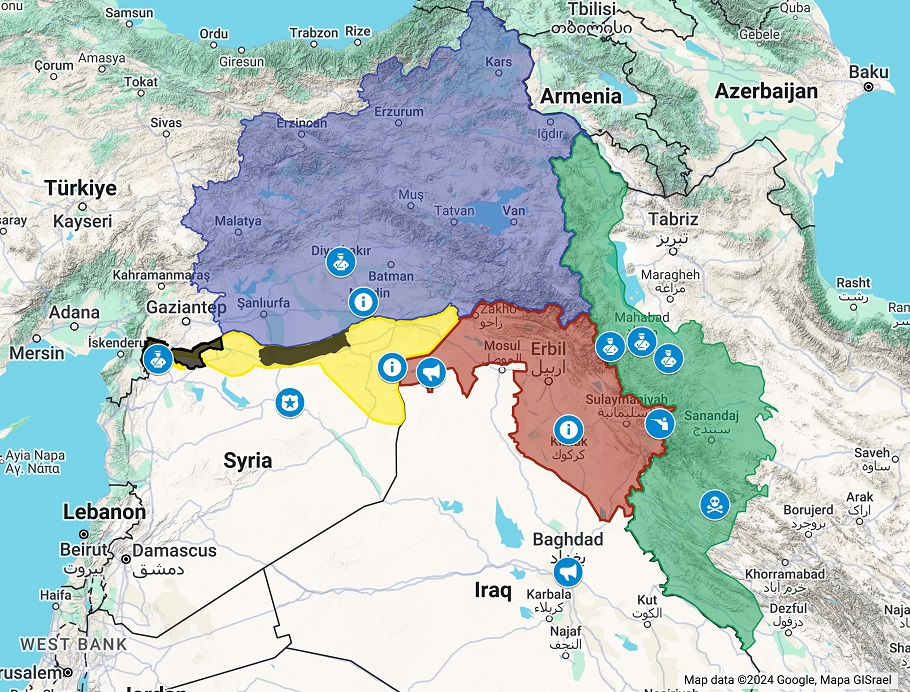1.4K
A Digest of Events in the Kurdistan Regions of Iran, Iraq, Syria, and Turkey.
Iran
- The Iranian regime executed Reza Rasaei, a 34-year-old Kurdish political prisoner detained during the 2022 Woman, Life, Freedom movement, at Dizel Abad Prison. His death sentence, condemned by human rights groups for serious due process violations and torture-extracted confessions, is part of a larger crackdown that has seen dozens of protesters either executed or sentenced to long prison terms. Meanwhile, Iranian intelligence forces arrested three members of exiled Kurdish political activist Hassan Vazhi’s family in Piranshahr and violently detained relatives of the slain protester Mohammad Hassanzadeh in Bokan. Additionally, three Kurdish religious activists in Bokan face charges of “rebellion.” The Hengaw Organization for Human Rights reports that Iranian authorities have arrested 92 individuals nationwide in July, including 49 Kurds. Concurrently, the crackdown on Kurdish border porters continued, with border guards killing 25-year-old Asad Afranjeh near Marvian, bringing the number of kolbar deaths since July to six. In Mehabad, police shot dead the father of a young Kurdish man following an altercation between his son and Basij forces.
Iraq
- On August 5, Iranian-backed militias launched a rocket attack on the Ain al-Assad air base, which houses U.S. service members, marking a resurgence in hostilities after a several-month hiatus. The Joint Operation Command has obtained intelligence on the attackers, and the White House has vowed to respond to any aggression against U.S. personnel “in a manner and place” of their choosing. Concurrently, Rudaw reported the re-deployment of a small number of U.S. troops to Kirkuk after a seven-year absence. Iranian-backed militias have previously targeted U.S. troops and diplomatic missions, including in Kurdistan.
- Iraq’s Judicial Authority for Elections has disbanded three political parties linked to the Kurdistan Workers’ Party (PKK), reflecting Baghdad’s deeper involvement in Turkey’s conflict with PKK fighters in northern Kurdistan. The parties affected are the Yazidi Freedom and Democracy Party, the Democratic Struggle Front Party, and the Kurdistan Community Party, or “Tavgari Azadi.” The Iraqi government, under Turkish pressure, has recently banned the PKK, while Turkish forces continue bombing PKK positions, causing civilian casualties and displacing hundreds of families in Dohuk and Erbil.
- On the tenth anniversary of the Yazidi Genocide by ISIS, the Kurdistan Region presidency has urged the federal government to implement the Shingal Agreement. This 2021 agreement calls for the withdrawal of security forces and armed groups from Shingal and the establishment of local police control. The district remains unstable, lacking essential services, which discourages displaced Yazidis from returning to their homes.
Syria
- The Autonomous Administration for North and East of Syria (AANES) released more Syrian families from al Hol camp that hold Da’esh relative. The initiative is part of an amnesty issued after tribal leaders sponsored the release and guaranteed their return to normal life. The 82 families, mostly women and children, have returned to Deir Ez Zor province. That said, Da’esh activities continue to increase in Syria, including targeting an oil investor. On August 2, the Syrian Democratic Forces (SDF) supported by the US-led international coalition, arrested a Da’esh cell in al Karamah, east of Raqqa. The cell, responsible for attacks on the security forces and civic institutions, was captured after a raid on their hideout.
- Human Rights Watch criticized Türkiye for hosting and publicly celebrating two Syrian National Army (SNA) faction leaders accused of serious human rights abuses, including unlawful killings, torture, and sexual violence. The HRW report noted that the meeting, involving Turkish nationalist leader Devlet Bahçeli and a convicted mafia boss, highlights Türkiye’s failure to address or curb atrocities committed by groups it supports in northern Syria, fostering an environment of impunity and undermining efforts for accountability in the region. Meanwhile, Turkish-backed factions in occupied Afrin have recently arrested four Kurdish civilians to extort financial ransoms, according to the Syrian Observatory for Human Rights (SOHR). In other Turkish-occupied areas, protests erupted against Turkey’s plan to normalize relations with the Assad regime, a move that protesters fear could jeopardize the safety of millions of Syrians. On Saturday, the Russian envoy to Syria, Alexander Lavrentyev, visited Ankara to resume talks of normalization between the Syrian regime and Turkey.
Turkey
- In recent weeks, the Turkish government has arrested dozens of Kurds at weddings across the country, accusing them of “terrorist propaganda” for playing specific songs and chanting certain slogans. This crackdown is part of a broader campaign to suppress Kurdish political and cultural expression, coinciding with Turkey’s military operations against the PKK in Iraqi Kurdistan. The government has intensified its actions against those associated with the Kurdish movement, banning most Kurdish songs related to freedom and revolution. In 2018, a Kurdish man was beaten and arrested for whistling a Kurdish revolutionary song. The pro-Kurdish Peoples’ Equality and Democracy Party (DEM) condemned recent actions, comparing them to the dark years of past repression. They criticize the government’s crackdown on Kurdish cultural expressions and accuse the authorities of employing racist tactics. The DEM Party has called for the release of those detained and urged the government to end discriminatory practices. Separately, the Constitutional Court has overturned the conviction of Abdurrahim Kılıç, who was previously found guilty of “terrorist propaganda” for wearing a t-shirt with the word “Kurdistan” and the Mesopotamian Sun emblem.
- Turkey has banned several top VPN services amid ongoing disruptions to internet access, including a four-day block on Instagram. The ban on Instagram, enforced without much explanation, is believed to be in response to the platform’s restriction of condolence messages following the assassination of Hamas leader Ismail Haniyeh.

